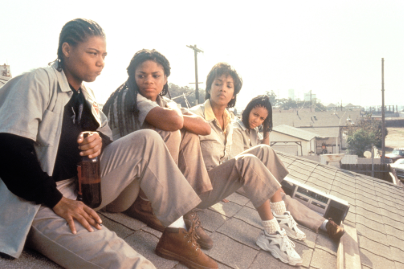In this section, I will explain the theoretical application if a social structure theory. The social structure theory that best explains why the women committed the bank robbery is General Strain Theory. This theory, from Robert Agnew in 1992, by identifying the three sources of strain: there was removal of positively of positively valued stimuli, failure to achieve positively valued goals, and the presence of inescapable negative stimuli (Vito, p.148) Agnew theorized that strain leads to negative emotions, like anger and depression. Individuals either have the ability to cope with strain and also have a negative emotion, or just not have one. If they are unable to cope, then it will lead to crime. Agnew said that trains “that are large in magnitude and viewed as unjust, are more likely to provoke a delinquent response” (Vito, p. 148). Each of the women in Set-It-Off experiences at least one of these strains. At the beginning of the presentation of the movie “Set-It-Off”, it looked like Frankie had achieved positively valued goals. In the opening scene it showed her happy at her job and being friendly to her co-workers and customers. We later see that she has worked for her job for over two years and has been promoted.

Once the bank got robbed, her achievements were taken away from her. The police accuse her of being involved and her manager fries her. For Frankie, the loss of her job represents removal of positively valued stimuli. Importantly, this removal of positive stimuli is also large and unjust. Frankie makes her anger clear. Hanging out with Cleo at her car, saying how she wants to blow up a bank. After Stevie’s death, GFrankie says that robbing a bank is a way to get back at the system that has been keeping them down. After their first robbery, Frankie doesn’t think T.T should get a cut of the money that she didn’t help in the robbery, but apologizes for saying all those wrong things about T.T and for getting angry at her. Stony also appeared to have achieved positively valued goals at the beginning of the movie. After the death of her parents car accident that took place two years ago, she stepped up and started to take care of her brother, Stevie. She also has managed to pay the rent on the house and by a proud older sister for her younger brother, in graduating from high school. She thinks that he will be going to UCLA. Her positively valued goal is not her own economic success, it is Stevie’s economic success. The first sign that there was a problem is when Stevie tells Stoney that he didn’t get into UCLA and didn’t even want to go.
Stony has actually failed to achieve her most important goal. However, what really changes things for Stoney is that Stevie is killed by the police when they mistake his champagne for a gun. Stevie’s death is both large in magnitude and unjust. Unlike Frankie, Stoney appears more depressed than angry. When she eventually tells Keith that she feels like she’s in a cage that shows her still being depressed. From the very beginning of the movie, T.T is struggling financially. Her goal is to provide for her baby child. Right away, we learn that her paycheck is not enough for her to be able to afford a babysitter. So, it seems like this represents a failure to achieve positively valued goals. Eventually, she brings her son to work and he gets into some cleaning supplies which cause to harem him. A woman came and took the son to hospital and the doctor tells T.T that her son will be fine, but Ms. Wells informs T.T that the workplace is not a safe area for her son to be around and that Child Protective Services is taking temporary valued stimuli. All of the women complain that it was just an accident. Though it was clear that this strain is viewed as unjust. It is also large in magnitude. Even so, Cleo is a little different because she is impulsive and it seems like she is as interested in the thrill of robbing a bank as she is in the money.
The general strain theory is still applied to Cleo. She wanted to fix up her car since seventh grade. Then it seems to be her only goal in life. Still, it is a positively valued goal that she failed to achieve. When the women are sitting on the roof, Cleo does comment about how the factory across the street used to pay well before they started to lay people off. She makes a joke about how for that kind of money, she’d be a perfect employee. Cleo doesn’t experience any loss before the robbery, but she seems to feel her friends’ losses. She is a vocal on night that Stevie dies and, in the hospital, when Ms. Wells takes custody of T. T’s son. When Frankie doesn’t want to pay T.T a cut from the bank heist for being scared, Cleo comments that T.T needs the money more than the rest of them. And finally, Luther’s insults towards the girls to be considered inescapable negative stimuli. Although all of the women have to deal with Luther, he definitely insults Cleo the most.